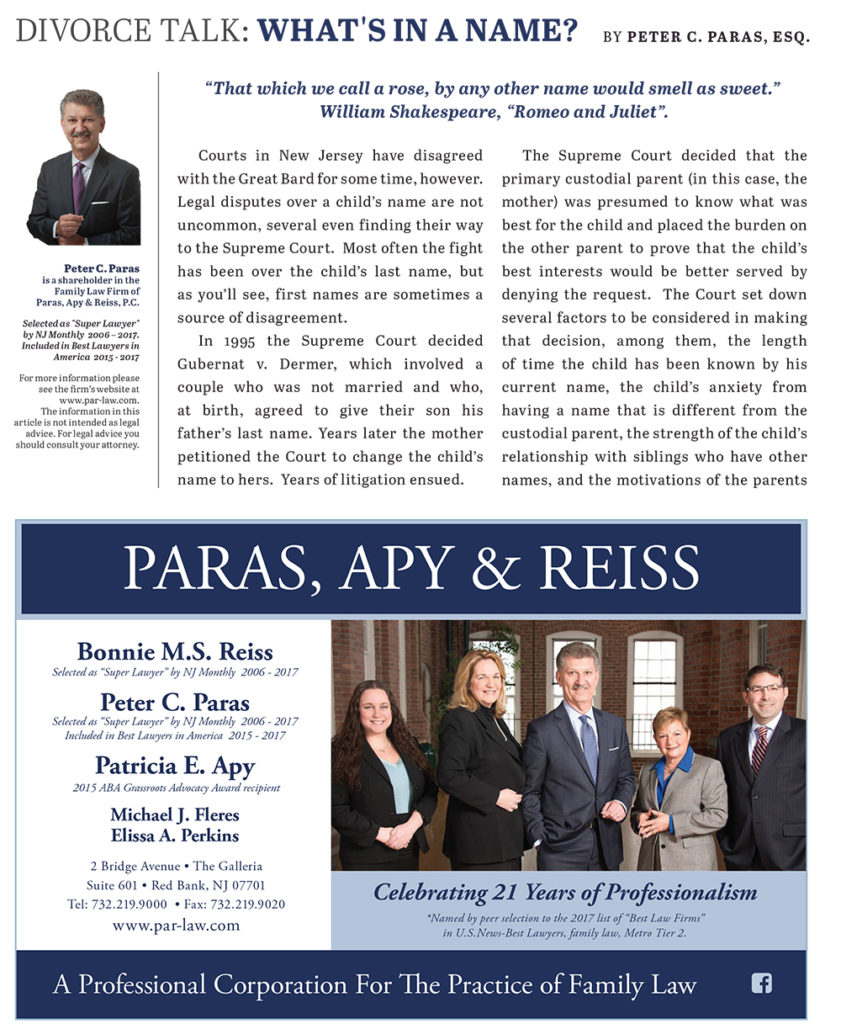“That which we call a rose, by any other name would smell as sweet.” William Shakespeare, “Romeo and Juliet”.
Courts in New Jersey have disagreed with the Great Bard for some time, however. Legal disputes over a child’s name are not uncommon, several even finding their way to the Supreme Court. Most often the fight has been over the child’s last name, but as you’ll see, first names are sometimes a source of disagreement.
In 1995 the Supreme Court decided Gubernat v. Dermer, which involved a couple who was not married and who, at birth, agreed to give their son his father’s last name. Years later the mother petitioned the Court to change the child’s name to hers. Years of litigation ensued.
The Supreme Court decided that the primary custodial parent (in this case, the mother) was presumed to know what was best for the child and placed the burden on the other parent to prove that the child’s best interests would be better served by denying the request. The Court set down several factors to be considered in making that decision, among them, the length of time the child has been known by his current name, the child’s anxiety from having a name that is different from the custodial parent, the strength of the child’s relationship with siblings who have other names, and the motivations of the parents in requesting or opposing the change. The Supreme Court sent the case back to the Family Court to decide what was in the child’s best interests. The case, however, ended tragically when the father, who was so distraught over the Supreme Court’s decision, killed the child and himself.
In 2013 the Supreme Court decided Emma v. Evans, another dispute over a child’s surname. In that case the Court did away with the preumption that the primary custodian knows best and ruled that the child’s best interests are the determining factors. The Court also decided that this analysis applies to children born to parents who are not married to each other, as well as children born to parents who are.
As science and society advance, the law must inevitably keep pace. And so, as could be anticipated, on June 28, 2017, a Family Court judge was called to decide a dispute between exspouses over their sixteen year old child’s first name. The daughter that was born to them was transgender and wanted to legally change his name from Veronica, his birth name, to Trevor, the name he had been using for five years.
The trial judge, following the Supreme Court’s dictates, but applying them to a completely different and legally novel case, concluded that, under the circumstances of that case, it was, indeed, in Trevor’s best interests to be legally known as Trevor.
Thus, it seems Shakespeare was wrong – at least in this context. Names are important to people’s identity, mental and emotional health, and even physical health. The Gubernat child might be alive if his surname was not so important to his parents. And life would not be the same for Trevor if he was legally required to be known as Veronica. It would not smell as sweet.


